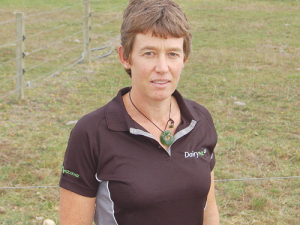DairyNZ opens applications for associate director role
DairyNZ is giving New Zealand farmers a unique opportunity to gain hands-on governance and leadership experience within the dairy sector.
 DairyNZ strategy leader Dr Jenny Jago says the wellbeing of animals is at the heart of every dairy farm.
DairyNZ strategy leader Dr Jenny Jago says the wellbeing of animals is at the heart of every dairy farm.
The cow carcases photographed by Farmwatch appear to have been tipped over a bank into a gully -- not an offal pit, said spokesman John Darroch.
“When we arrived at the scene rats were running over the carcases. The gully was within 10m of a stream and 20m from a swamp.
“I am certain the owners must have been aware of this gully full of bodies; it appeared that the bones in it were many years old. I think this gully of bodies predates our [filming] the individual abusing animals,” he says.
Northland Regional Council, which is responsible for approving and monitoring offal pits, says it’s investigating the farm in question.
Colin Dall, group manager regulatory services, told Dairy News that if the photographs are correct, the so-called offal pit does not comply with NRC regulations which require pits to meet certain standards, one of which is that animals must be covered. He says the pit on the Mangapai dairy farm has no consent so is illegal.
Dall said last week that his staff were planning to visit the site soon and report fully.
The rules on offal pits in Northland require them to be not less than 50m from a waterway or bore, not less than 50m from a residence and there can be no direct discharge of leachate to surface water.
Offal pits and dead stock disposal sites must be covered to prevent nuisance odours and exclude vermin.
The rules also state that the volume of offal or dead stock dumped on any one property must not exceed 5cu.m per year.
With the involvement of NRC, this means that two separate investigations are now taking place on the farm: MPI is looking at animal welfare issues and the council at the offal pit.
Dairy News asked DairyNZ to supply a contact phone number for the owners of the farm, but at press time had had no response. Dairy News had planned to ask the owners if they were aware of the acts of animal cruelty and the state of the offal pit before this was revealed by Farmwatch, when they last visited the farm and how often they visited.
DairyNZ issued a brief statement on the animal cruelty issue at the farm. Strategy leader Dr Jenny Jago says the wellbeing of animals is at the heart of every dairy farm, that it’s not okay to treat any animal poorly -- ever -- and that the vast majority of farmers care deeply about their animals.
“This footage is disturbing and it has been reported that a complaint has been laid. This type of appalling behaviour is absolutely not representative of the thousands of farmers who work with cows every day and are passionate about animal welfare,” she says.
Jago says cruel and illegal practices are not in any way condoned or accepted by the dairy sector as part of dairy farming. Farmers who treat cows badly shouldn’t be working in the dairy sector, she says.
The World Wide Sires National All Day Breeds Best Youth Camp Best All Rounder plaudit has become family affair, with 2026 Paramount Cup winner Holly Williams following in her sister Zara's footsteps.
DairyNZ is giving New Zealand farmers a unique opportunity to gain hands-on governance and leadership experience within the dairy sector.
Herd improvement company LIC has posted a 5.2% lift in half-year revenue, thanks to increasing demand for genetics.
According to the latest Fresh Produce Trend Report from United Fresh, 2026 will be a year where fruit and vegetables are shaped by cost pressures, rapid digital adoption, and a renewed focus on wellbeing at home.
The Roar is a highlight of the game hunting calendar in New Zealand, with thousands of hunters set to head for the hills to hunt male stags during March and April.
OPINION: The past few weeks have been tough on farms across the North Island: floods and storms have caused damage and disruption to families and businesses.
OPINION: Fonterra may be on the verge of selling its consumer business in New Zealand, but the co-operative is not…
OPINION: What does the birth rate in China have to do with stock trading? Just ask a2 Milk Company.